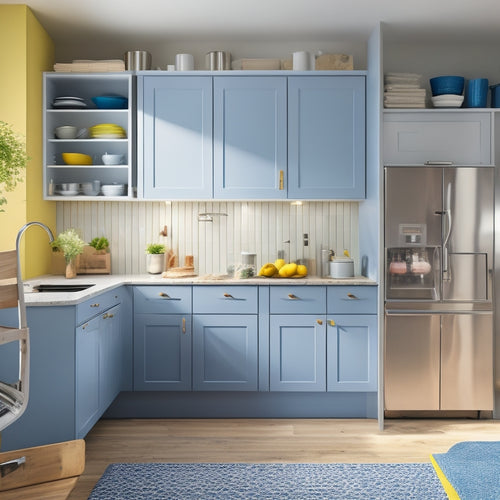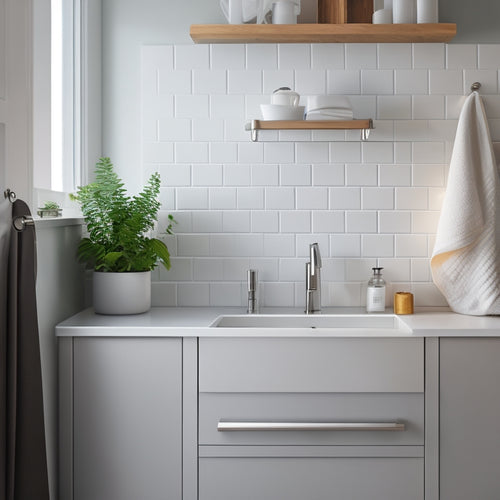
Why Busy Professionals Need a Kitchen Cleaning Schedule
Share
As a busy professional, you know that a cluttered kitchen is not just an eyesore, but a major productivity killer that can impede your ability to manage your time, energy, and mental clarity. A messy kitchen can lead to decreased productivity, increased stress, and even affect your mental health. Implementing a cleaning schedule helps you regain control of your time and energy, allowing you to focus on task completion with confidence. By prioritizing tasks and creating a realistic cleaning plan, you'll reduce stress and anxiety in the kitchen. Now, discover how to create a tailored cleaning schedule that fits your busy lifestyle and transforms your kitchen into a haven of productivity.
Key Takeaways
• A kitchen cleaning schedule helps busy professionals regain control of their time and energy, reducing stress and increasing productivity.
• A tidy kitchen improves mental clarity and confidence, allowing for better focus and task completion.
• Effective time management through a cleaning schedule saves time and energy, allocating tasks to specific days and reducing overwhelm.
• A clean kitchen promotes a sense of control and peace of mind, positively impacting mental wellness and reducing anxiety.
• A realistic cleaning plan can be implemented and maintained, even with a busy schedule, by setting achievable goals and prioritizing tasks.
Kitchen Chaos Affects Productivity
How often do you find yourself standing in your kitchen, surrounded by dirty dishes and scattered leftovers, wondering how you'll get everything done on your to-do list? A cluttered kitchen can be overwhelming, making it difficult to focus on the tasks at hand.
When your kitchen is in disarray, it's hard to maintain mental clarity and organization, two essential components of productivity.
Effective time management is vital for busy professionals, and a messy kitchen can hinder your ability to prioritize tasks and stay on track. When you're constantly surrounded by chaos, it's challenging to allocate your time wisely, leading to decreased productivity and increased stress levels.
By implementing a kitchen cleaning schedule, you can regain control of your time and energy. A clean and organized kitchen helps you stay focused, allowing you to tackle your to-do list with confidence.
Messy Kitchen Impacts Mental Health
Standing in a cluttered kitchen, you can't help but feel a sense of anxiety wash over you, as the mess seems to mirror the turmoil brewing in your mind. The stacks of dirty dishes, crumbs scattered on the countertops, and overflowing trash cans create a sense of overwhelm, making it difficult to focus on anything else. Research has shown that a cluttered environment can negatively impact your mental health, leading to increased stress levels, anxiety, and depression.
On the other hand, a tidy kitchen can have a profound impact on your mental wellness. Mindful cleaning can be a therapeutic activity, allowing you to clear your mind and focus on the task at hand. A clutter-free kitchen can bring you a sense of peace of mind, making you feel more grounded and in control.
Cleaning Schedule Saves Time
Your hectic schedule as a busy professional demands efficiency, and a cleaning schedule can be a game-changer in saving you time and energy. By allocating specific tasks to specific days, you'll avoid wasting time on unnecessary cleaning sessions. A cleaning schedule helps you prioritize tasks, ensuring that you focus on the most critical areas of your kitchen.
Here's a sample cleaning schedule to get you started:
| Task | Frequency |
|---|---|
| Daily wipe-downs | Daily |
| Load/unload dishwasher | Daily |
| Clean countertops | 2-3 times a week |
| Mop kitchen floor | Weekly |
| Deep clean appliances | Monthly |
Prioritizing Tasks Reduces Stress
By prioritizing tasks, you'll tackle the most essential areas of your kitchen first, reducing stress and anxiety that comes with a messy space. Effective time management is key to maintaining a clean kitchen, and prioritizing tasks is a pivotal aspect of it. When you focus on the most important tasks, you'll feel more in control and confident in your ability to keep your kitchen clean.
Here are four ways prioritizing tasks can reduce stress in your kitchen:
-
Identify high-traffic areas: Focus on cleaning high-traffic areas, such as the sink and stove, to prevent the buildup of dirt and grime.
-
Tackle clutter hotspots: Identify clutter hotspots, like countertops and cupboards, and tackle them first to prevent clutter from building up.
-
Address spills and stains: Prioritize cleaning up spills and stains immediately to prevent them from becoming stubborn messes.
- Break tasks into chunks: Divide larger tasks, like deep cleaning the fridge, into smaller, manageable chunks to reduce feelings of overwhelm.
Creating a Realistic Cleaning Plan
Now that you've prioritized your tasks, it's time to create a realistic cleaning plan that fits your busy schedule.
You'll need to set achievable goals, adjust for exceptionally busy days, and focus on high-traffic areas that require extra attention.
Set Realistic Cleaning Goals
Establishing a realistic cleaning plan starts with understanding your lifestyle and cleaning habits, so you can set achievable goals that fit seamlessly into your busy schedule. You need to be honest with yourself about how much time you can dedicate to cleaning and what tasks are priorities for you.
To set realistic cleaning goals, follow these steps:
-
Assess your time management: Be realistic about how much time you can allocate to cleaning each day/week. Don't overcommit yourself, or you'll end up feeling frustrated and giving up.
-
Prioritize tasks: Identify the most important cleaning tasks that need to be done regularly, such as wiping down counters or loading the dishwasher.
-
Make it consistent: Choose a specific day and time to do your main cleaning tasks, and stick to it. Consistency is key to maintaining a clean kitchen.
- Break it down: Divide larger tasks into smaller, manageable chunks, making it easier to stay on track and achieve your cleaning goals.
Identify Busy Day Exceptions
You'll need to accommodate days when your schedule gets turned upside down, so it's important to identify busy day exceptions that may require adjustments to your cleaning plan.
Life is unpredictable, and exceptional circumstances will arise, throwing your routine off balance. That's why it's essential to anticipate and plan for these busy day exceptions.
Take a closer look at your calendar and identify days when you have early meetings, late nights, or family commitments that might leave you with little time for cleaning. By recognizing these exceptions, you can adjust your cleaning schedule accordingly, ensuring you don't set yourself up for failure.
Effective time management is key here. You'll need to prioritize your responsibilities, focusing on the most critical tasks and delegating or deferring others when necessary.
Prioritize High-Traffic Areas
Flexibility in your cleaning plan begins with identifying the high-traffic areas of your kitchen that require frequent attention, ensuring a clean and hygienic space despite your busy schedule. By prioritizing these areas, you'll be able to maintain a clean kitchen even on the most hectic days.
Here are the top areas to focus on:
-
Countertops: Wipe down countertops daily to remove crumbs, spills, and stains that can attract pests and harbor bacteria.
-
Sink and faucet: Clean the sink and faucet after each meal to prevent grease and food residue buildup.
-
Stovetop and oven: Clean up immediately after cooking to prevent food residue from hardening and making deep cleaning more difficult.
- Refrigerator handles: Wipe down refrigerator handles daily to prevent the spread of germs and bacteria.
Assigning Tasks to Family Members
When it comes to maintaining a clean kitchen, you can't do it alone, especially if you live with family members. To make it more manageable, you'll want to assign tasks to each person to share the responsibilities.
Delegate Tasks Fairly
By involving your family members in kitchen cleaning tasks, you can distribute the workload more evenly and free up time for other priorities. This doesn't mean dumping all the tasks on one person, but rather, finding a fair division of labor that works for everyone.
To delegate tasks fairly, consider the following:
-
Task rotation: Rotate tasks among family members every few weeks to avoid monotony and prevent anyone from getting stuck with the same task indefinitely.
-
Age and ability: Assign tasks based on age and capability, making sure that each person is responsible for tasks they can handle.
-
Personal preferences: Consider each person's likes and strengths when assigning tasks, making it more likely they'll stick to their responsibilities.
- Clear communication: Regularly communicate with your family members about their tasks, deadlines, and expectations to avoid confusion and make sure everyone is on the same page.
Share Household Chores
To secure a clean kitchen, assign specific tasks to each family member, taking into account their strengths, weaknesses, and availability, and make certain they understand their responsibilities.
This way, you'll avoid overwhelming anyone and safeguard that everyone contributes to the household chores. By sharing tasks, you'll not only maintain a clean kitchen but also promote a sense of teamwork and responsibility among family members.
When delegating tasks, consider each person's schedule and skills. For example, if your teenager is a morning person, assign them breakfast cleanup duties. If your partner is a tidy person, put them in charge of wiping down surfaces.
Designate Cleaning Zones
Divide your kitchen into distinct cleaning areas, and then assign each zone to a family member based on their skills and preferences. This approach helps to distribute the workload evenly and guarantees that everyone is accountable for their designated area.
By doing so, you'll create a sense of ownership and responsibility among family members, making cleaning a team effort.
Here are some tips to help you designate cleaning areas effectively:
-
Counter Area: Assign a family member to clean the counters, sink, and faucet.
-
Appliance Area: Designate someone to clean the stove, refrigerator, and dishwasher.
-
Floor Area: Have someone sweep, mop, and vacuum the kitchen floor.
- Cabinet Area: Assign a family member to organize and clean the kitchen cabinets.
Maximizing Kitchen Storage Efficiency
Optimizing your kitchen's storage capacity allows you to reclaim valuable counter space and streamline meal prep. By implementing effective storage solutions, you can keep frequently used items within easy reach, reducing clutter and increasing productivity. Start by evaluating your kitchen's layout and identifying areas where you can improve space utilization. Consider investing in adjustable shelving, stackable containers, or a pegboard to maximize your storage capacity.
Next, focus on implementing organization tips that work for you. For instance, you can designate specific zones for different tasks, such as a coffee station or a baking area. This will help you maintain a sense of order and reduce the likelihood of clutter building up.
Additionally, adopt decluttering strategies like the 'one in, one out' rule to prevent unnecessary items from accumulating. By streamlining your storage and decluttering regularly, you'll be able to maintain a clean and efficient kitchen that supports your busy lifestyle.
With a well-organized kitchen, you'll be able to focus on what matters most – preparing delicious meals and enjoying quality time with loved ones.
Decluttering Before Deep Cleaning
Before you start scrubbing and sanitizing, take a few minutes to declutter your kitchen.
You'll want to clear everything off your countertops, sort through your belongings, and get rid of anything you no longer need or use.
Clear Off Countertops
Clearing everything off your countertops is the vital first step in deep cleaning your kitchen, as it gives you a clean slate to work from and helps you identify what needs attention. This process is essential for achieving effective kitchen organization and creating a clear workspace. By removing everything from your countertops, you'll be able to see what you have, what you need, and what you can get rid of.
Here are some benefits of clearing off your countertops:
-
Improved visibility: You'll be able to see what's on your countertops and what needs attention.
-
Easier cleaning: With a clear surface, you can focus on deep cleaning your countertops without obstacles.
-
Better organization: You'll be able to put back only what you need, creating a more organized and functional kitchen.
- Reduced stress: A clutter-free kitchen can help reduce stress and make meal prep more enjoyable.
Purge Unwanted Items
Now that you've cleared off your countertops, sort everything into categories to identify what you can purge, what you can donate, and what you'll keep. Be ruthless – if you haven't used it in the past year, it's likely you won't miss it.
Start with your pantry and declutter any expired or unused food items. Check your shelves for unused appliances, gadgets, or cookbooks that can be donated or tossed. Consider the 80/20 rule: 80% of the time, you likely only use 20% of your kitchen items.
Next, tackle your cabinets and drawers. Remove any broken or worn-out items, and sort the rest into categories like baking, cooking, or storage. Be honest with yourself – if you have multiple items that serve the same purpose, consider keeping only your favorite and donating or purging the rest.
Organize Kitchen Zones
Your kitchen is divided into zones, each serving a specific purpose, and organizing these zones is essential to creating a functional and efficient space. By categorizing your kitchen into distinct areas, you can optimize your workflow and maximize productivity. A well-organized kitchen layout can greatly enhance your productivity, making meal prep and cooking a breeze.
To get started, identify the following zones in your kitchen:
-
Food Prep Zone: Designate a specific area for food preparation, including a countertop, utensils, and appliances.
-
Cooking Zone: Identify the area around your stove or cooktop, where you'll store pots, pans, and cooking utensils.
-
Cleaning Zone: Assign a specific area for cleaning supplies, such as a sink, dishwasher, and trash can.
- Storage Zone: Designate a zone for storing food, cookware, and other kitchen essentials.
Implementing Daily Maintenance Habits
By dedicating just a few minutes each day to simple tasks, you can prevent crumbs, spills, and clutter from building up and overwhelming your kitchen. This is where daily habits come in – small, consistent actions that make a big difference in the long run.
Start by allocating a specific time slot in your daily routine for kitchen maintenance, whether it's during breakfast, right after dinner, or before bed. This will help you prioritize time management and make sure that cleaning becomes a non-negotiable part of your daily routine.
Some daily habits to get you started include wiping down the counters and sink after meals, loading the dishwasher or washing dishes immediately, and quickly sweeping or vacuuming the floor. You can also designate a specific day for tasks like cleaning the fridge, oven, or microwave.
Maintaining a Clean Kitchen Culture
Daily, you reinforce a clean kitchen culture when everyone in the household takes ownership of their actions and is mindful of the mess they create. This mindset is essential for busy professionals who value kitchen cleanliness and professional organization. By instilling a sense of responsibility, you'll find that everyone is more likely to pitch in and maintain a tidy kitchen.
Here are some ways to maintain a clean kitchen culture:
-
Designate cleaning tasks: Assign specific tasks to each household member to make sure everyone is contributing to the kitchen's cleanliness.
-
Lead by example: Show others that kitchen cleanliness is a priority by consistently cleaning up after yourself.
-
Make it a habit: Incorporate cleaning into your daily routine, such as wiping down counters after breakfast or loading the dishwasher after dinner.
- Praise and encourage: Acknowledge and appreciate others' efforts in maintaining a clean kitchen, which will motivate them to continue doing their part.
Related Posts
-

Smart Storage Solutions for Small Kitchen Spaces
You're struggling to find space in your small kitchen, but don't worry, smart storage solutions can help. Start by ut...
-

Streamlined Kitchen Sink Organization Solution
A streamlined kitchen sink organization solution must balance functionality with aesthetics. A well-designed system s...

